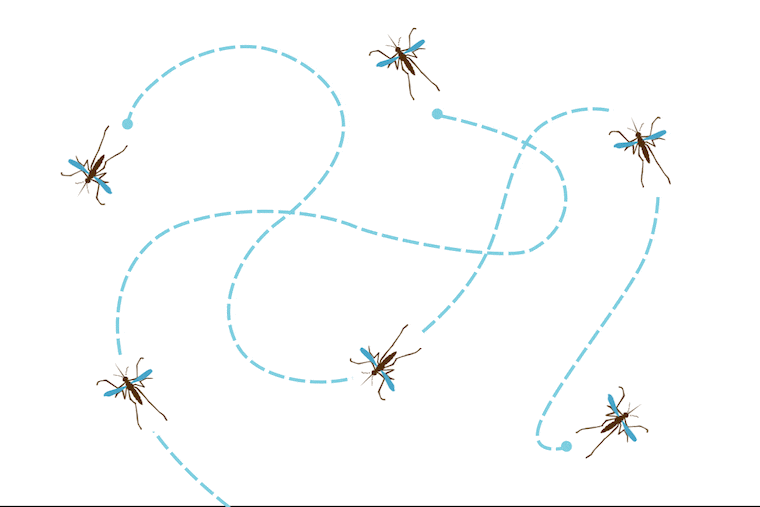How to keep mosquitoes away from your backyard
Plus, what to do to soothe those itchy, itchy bites.

Imagine an idyllic summer evening. You’re sitting on your patio, enjoying a cold beer or a juicy burger when a pesky mosquito takes a bite. A short while later, as a red bump forms on your ankle, you’re swatting at the disease-carrying insect’s cohort. Soon enough, you’ve retreated into your kitchen, itchy and irritated.
Philly recently ranked as one of the 10 worst cities in the country for mosquitoes, according to Orkin; it jumped up nearly 10 spots from last year in the pest control provider’s annual list.
“This year has been exponentially worse,” said Oron Rosenkrantz, who owns City Best Pest Control in Passyunk Square. “It’s been a real problem because of the rain.”
So, how do you keep mosquitoes at bay in your backyard? Whether you want them gone for good or just away for the evening, we’ve got advice from the experts.
Find them where they live
Generally, female mosquitoes lay eggs, 100 at a time, usually on water in shady spots after eating (i.e., biting you). After the eggs hatch, the larvae swim around for about five days before developing into pupae. After another few days, an adult mosquito emerges.
If you look at standing water with mosquito larvae in it, you can actually spot them wriggling around — they look like small, hairy worms less than a quarter-inch long. This is the best place and time to kill mosquitoes.
“It only takes about a capful of water for a mosquito to lay its eggs,” said Charles Evans, who runs Evans Pest Control in Kensington. They have adapted to pretty much every single kind of aquatic situation: ponds, marshes, drainage ditches, water in tree holes and on leaves of plants, or artificial containers. (The exceptions are flowing streams and large bodies of water like lakes and seas.)
“You have to eliminate every source of standing water in your backyard — planters, gutters, everything,” Evans said.
Eliminate (or treat) standing water
Think about where rain collects in your yard, then do something about it. Clear water off tarps covering grills or lawn equipment. Drill holes in recycling containers. Fill puddle-prone areas with sand.
“If you have trash cans, it’s best to keep them upside down if they’re empty,” said Ryan Lees, the owner of Flea Flicker Pest Control in Mount Holly, N.J. He recommends clearing your yard of items like pool toys or equipment because they can collect standing water.
Evaluate your yard’s topography. “Patios are supposed to be pitched in a way where they drain properly,” Rosenkrantz said. “A lot of the city’s patios are done in brick, however, and that can be a problem because when tree roots grow, they lift up the brick pieces and destroy the pitch. But you can change over to larger patio stones to avoid this.”
If the mosquitoes are coming from under a deck, consider installing a French drain to remove water faster. If they are coming from a sewer inlet, Evans advises contacting the Department of Public Health to come out and treat it.
You can also treat standing water with Mosquito Dunks — donut-shaped tablets that, when placed in water, slowly release a larvicide that is nontoxic to humans, pets, fish, and other wildlife for up to 30 days. (Find them in hardware stores or on Amazon.) Just be vigilant about replacing them as soon as the larvicide wears off, otherwise you’ll be left with a perfectly good mosquito incubator.
Use nature to your advantage
If you have an extreme mosquito problem, professionals can give your home monthly treatments that cost about $35 to $50 a pop. This works best when it’s a joint effort, exterminators agreed. “You can treat your own yard, but if the bugs are coming from your neighbor’s house, then that’s not really helpful,” Rosenkrantz said.
But there are plenty of natural ways to fend off mosquitoes, too. Consider installing bird or bat houses. Both eat mosquitoes regularly — bats can consume up to their body weight in one night — so they can help keep the population in check.
You can also invest in some strongly scented garden plants, which repel mosquitoes. Rosenkrantz recommends growing garlic and rosemary for this purpose. The plants release enough of a scent to keep the bugs away. Citronella, lavender, and peppermint are also effective, especially when the flowers and leaves are crushed to release their fragrance.
Keep them away for an evening
Maybe your mosquito problem is mild and you only need to displace them for a few hours. In that case, you can always break out the DEET. But if you don’t like the feeling of sticky bug spray on your skin, there are other easy options.
Put a fan out on the patio. Mosquitoes struggle to locate hosts in winds over 10 mph because they’re naturally weak fliers and moving air dispels the carbon dioxide and odors they use to locate hosts. Yellow lightbulbs don’t attract mosquitoes, so switching in yellow for white bulbs can help cut down on bites.
One tactic to skip: citronella candles. The U.S. Centers for Disease Control and Prevention does not currently recommend them because the amount of citronella is often too low to repel the bugs for long. Instead, try something that’s cheaper and more effective.
“When I barbecue in the summer, one of my favorite tricks is to put a sprig of rosemary on the grill,” Rosenkrantz said. “Mosquitoes hate the scent of it.”